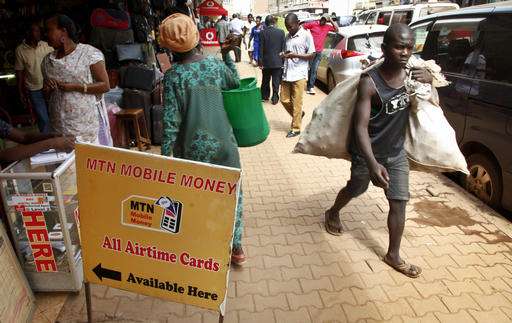Mobile money on the rise in Africa as millions get phones

Ivan Kiryowa repeatedly checked the balance on his phone, nervous sweat on his cheeks, as he waited for money from a friend. Thirty minutes later, $150 had landed in his account and he sauntered into a hardware store, where he bought bags of cement.
"Mobile money is convenient for many of us who rely on our phones to pay bills and make transactions without having to go to the bank all the time," Kiryowa said. "Without it, I think we would have a lot more problems."
Mobile money has become a way of life for millions of Africans who use their phones to pay utility bills, settle loans and even bail out friends in distress. There were 84 million active mobile money accounts in Africa as of December, according to the London-based industry group GSMA. It says there were mobile money operations in 31 African countries.
In the East African capitals of Kampala and Nairobi, where the phenomenon is particularly strong, booths offering mobile money services dot the streets. Now, even taxes can be paid via mobile phone in Uganda, in a revolution that threatens commercial banks as more and more people can afford handheld devices.
"When people come here to make mobile transactions, in effect this is their bank," said Charles Onyait, a mobile money agent in Kampala, the Ugandan capital. "The most important thing, of course, is the convenience of mobile money."
Only about 34 percent of adults in Africa have a traditional bank account, according to World Bank data. Analysts say mobile money is widening financial inclusion by tapping into unbanked Africans, especially in rural areas where banking facilities are few and illiteracy tends to be high.
The value of mobile money transactions in sub-Saharan Africa reached $655 million in 2014 and could surpass $1.3 billion by 2019, according to data by the consulting firm Frost & Sullivan.

This year, mobile money services have become international. In January, the London-based remittance service company WorldRemit and the South African telecom giant MTN Group announced a global partnership agreement that allows WorldRemit customers to send money instantly to MTN mobile money wallets in Rwanda, Uganda and Zambia, adding to the growing list of destinations where such transfers can be possible.
At the time, Serigne Dioum, the head of mobile financial services for MTN Group, said other countries would follow soon.
"For us this is a hugely important step, both for the remittances industry and the mobile money industry," said Alix Murphy, an analyst with WorldRemit. "With an agent-based model, there is always the commission for the agent whenever they are taking the cash and processing it. So we eliminate all of that."
MTN has more than 36 million mobile money subscribers in Africa. Millions more use providers such as Kenya's Safaricom, whose M-Pesa platform, launched in 2007, is now a global leader in mobile money services. In September 2013, M-Pesa reported deposits worth over $7 billion.
In Uganda, mobile money has overtaken cash pick-up and bank deposits as the preferred method to receive money, according to WorldRemit.
Mobile money has become such a part of life in parts of Africa that any disruptions in the network can inflict pain. Earlier this year, during Uganda's disputed presidential election, a government shutdown of social media included the blocking of the mobile money network, stranding millions of customers.
The four-day shutdown offered a "natural experiment" to test the impact of life without mobile money in an African country, according to the Consultative Group to Assist the Poor, a global partnership of 34 groups seeking to advance financial inclusion.
"Parents of school age children ... were unable to pay school fees," the group reported. "Others were left without access to utilities, as they could not conduct electricity top-ups or pay for water bills via their mobile money accounts."
© 2016 The Associated Press. All rights reserved.



















